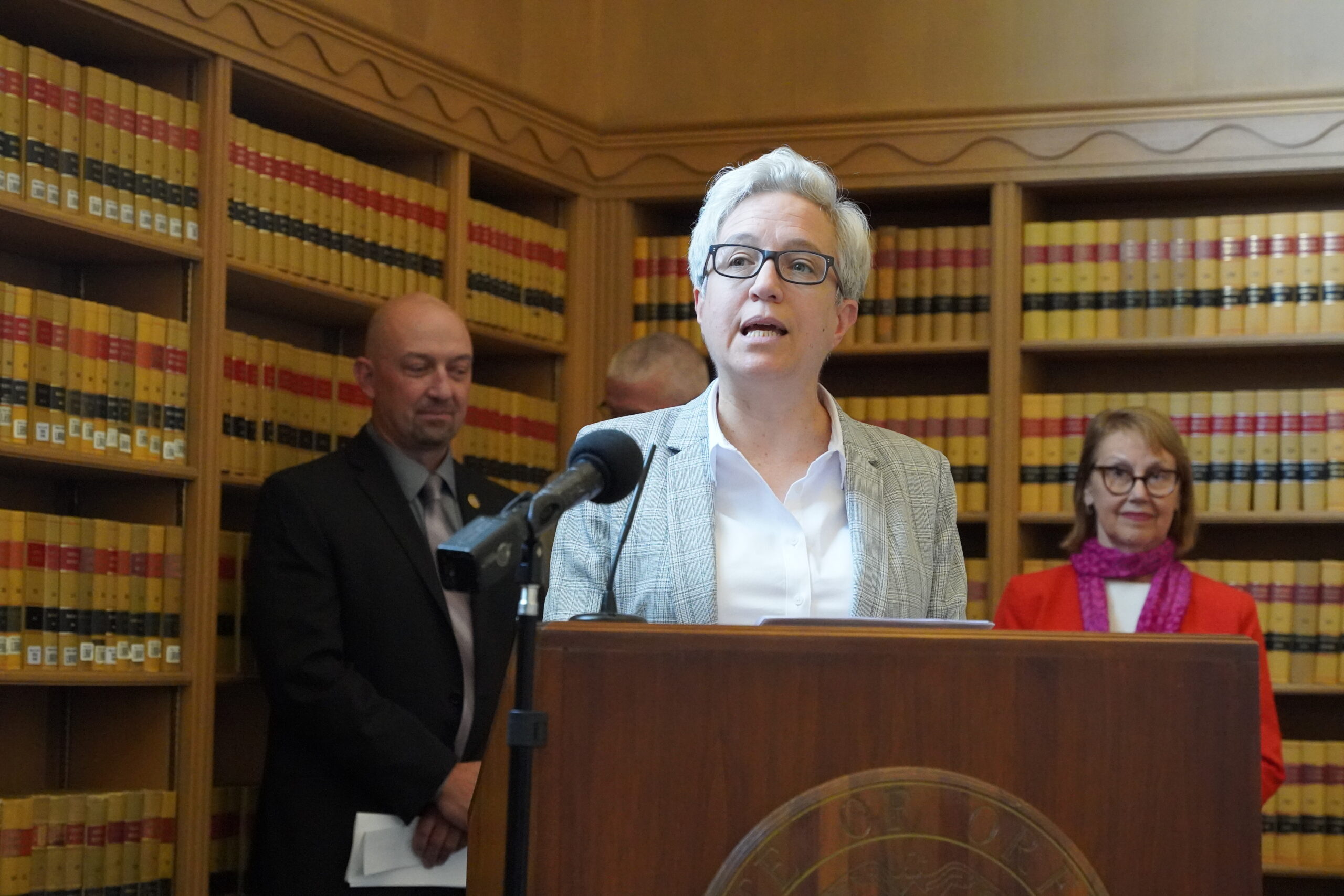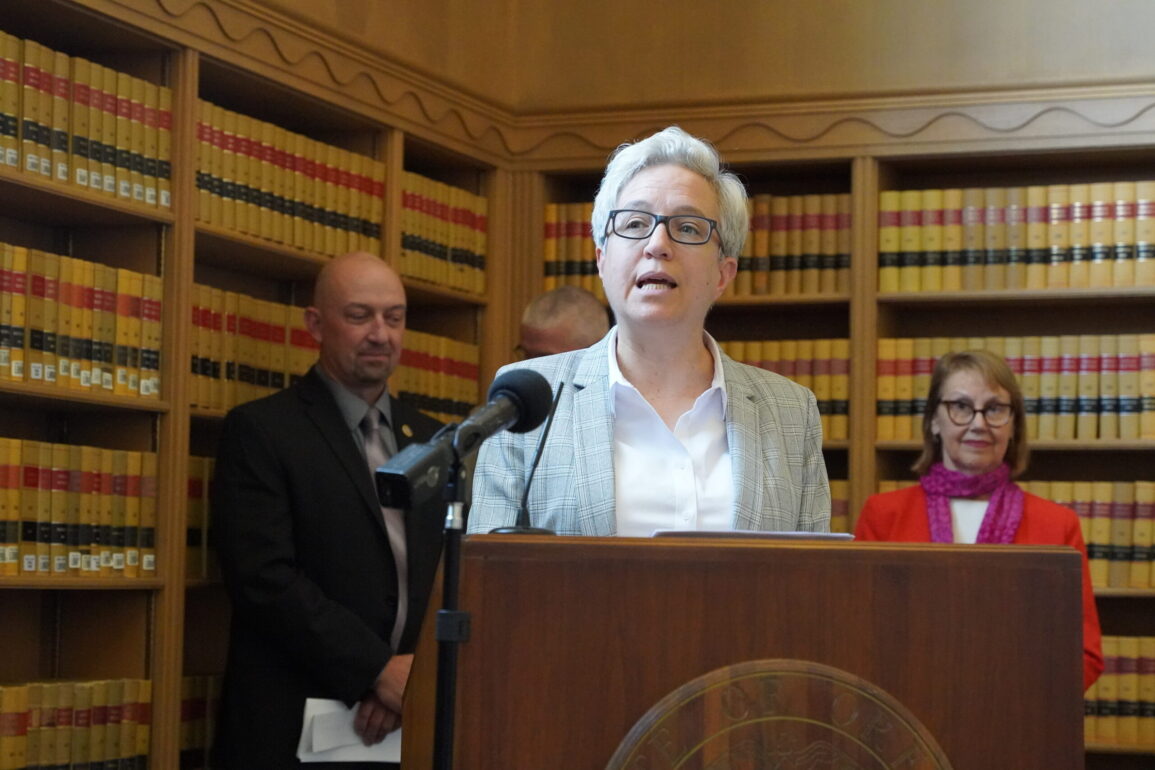
At a ceremonial bill signing for criminal justice bills in the Oregon State Library on Monday, Kotek celebrated some legislative victories, like the passage of a bill that bans undetectable firearms and another that addresses the state’s chronic shortage of public defenders as people sit in jail without attorneys to represent them.
But she had less to celebrate about the state of Oregon prisons following the recent release of two scathing reports unveiling problems at the state’s only women’s prison, Coffee Creek Correctional Facility in Wilsonville.
The reports – one commissioned by the state that was released last week and another by an advocacy group that came out in July – detailed a host of problems at the prison. The state report cited fears among inmates and staff about retaliation if they reported sexual misconduct. It also found inadequate mental health staffing for inmates on suicide watch. Prison employees reported they put the facility on frequent lockdowns and canceled recreational activities because of staff shortages. Prisoners suffered from the lockdowns, according to the other report which was based on dozens of interviews with inmates. They said prisoners were often neglected and mistreated and that self harm was rampant along with overdoses.
Kotek has acknowledged the problems at Coffee Creek, calling the state report “sobering” in a statement last week. Surrounded by advocates, lawmakers and law enforcement officials in the Oregon State Library, Kotek answered questions about the problems for the first time publicly. She said she was dissatisfied with the conditions at the prison and is eager to see the state improve them.
“I am not happy about the situation at Coffee Creek,” Kotek said. “But what I feel hopeful about is we have a very strong assessment with very clear recommendations.”
The state report was conducted by the Women’s Justice Institute, a Chicago-based advocacy group focused on female incarceration. The previous report was the work of the Oregon Justice Resource Center, a nonprofit advocacy group.
Both reports indicated that the Oregon Department of Corrections lacks transparency and accountability, particularly at Coffee Creek. Kotek’s office has said the agency needs more transparency as well.
Her office is searching for a new director for the Oregon Department of Corrections, something that was already underway before the reports came out. The Oregon Department of Corrections oversees about 12,000 inmates in a dozen prisons, including about 870 women incarcerated at Coffee Creek.
Search for new corrections director
The current leader of the Oregon Department of Corrections is Heidi Steward, who became interim director in August 2022 after former director Colette Peters left to head up the federal Bureau of Prisons. Former Gov. Kate Brown appointed Steward to the role before Kotek’s election.
Kotek, asked if she’s confident in the agency’s leadership, noted her office is recruiting a new director.
“I think Director Steward’s doing a good job getting us through this interim period,” Kotek said.
She blamed the current problems cited in the state report on past management.
“I think I inherited a lot of this from the previous director and previous administration,” Kotek said
Kotek’s search for a new corrections director could take several months at least, officials said.
Kotek is putting together an advisory group to go through the report and its recommendations and offer suggestions about what’s needed to move forward. That group will start meeting in September, and Kotek has directed the agency to come up with immediate steps to improve conditions.
The agency has hired Joan Palmateer, who was the first superintendent at Coffee Creek when it opened, to guide changes in the prison over the next seven months. Palmateer, who retired from the agency in 2008, will earn about $82,000 in pay and benefits for the work.
“It’s very important for me to have Coffee Creek operate with best practices that not only is good for the staff there but for the (inmates) who need to make sure we’re using trauma-informed, gender-informed practices, and I’m very committed to that,” Kotek said.
One recommendation from the report is that the state hire an “assistant superintendent of gender responsive operations and programs” to focus on the prison’s treatment of women and initiatives to improve conditions.
“I do think we need to have that type of focus,” she said.
Ceremony marks enactment of new justice laws
Gov. Tina Kotek ceremonial bill signing event on Monday celebrated the passage of criminal justice bills in the legislative session. She’s already legally signed the bills, but had the gathering to recognize supporters and advocates who advanced the measures.
“Each pillar of our justice system relies on the other – we must have adequate staffing levels and training for law enforcement, we must have a commitment to upholding victims’ rights and their access to justice, and we must honor the rights of the accused,” Kotek said. “These bills represent concrete steps forward to ensuring that Oregonians are safe and have trust in the justice system.”
The bills were:
- House Bill 2005, which regulates undetectable and untraceable “ghost guns,” which hamper police investigations because they lack serial numbers. The bill also bans untraceable guns that evade metal detectors, such as those made with plastic parts from a printer. “More and more ghost towns are being used to commit crimes with the knowledge that law enforcement will have a difficult or maybe even an impossible time connecting the perpetrator to the crime,” Attorney General Ellen Rosenblum said at the event.
- House Bill 2645, which increases penalties for the possession of fentanyl, making it a class A misdemeanor for possession of one gram or more. Fentanyl is 50 times stronger than heroin and deadly: 1,275 Oregonians died from a fentanyl overdose in 2021. A class A misdemeanor is punishable by up to a year in jail.
- Senate Bill 337, which overhauls Oregon’s public defense system, which is in a crisis as people in jail who cannot afford an attorney are unable to access a public defender. Those changes include improving the pay of public defenders, which often isn’t competitive with the pay of state prosecutors or attorneys in the private sector.
State court data on Monday showed 140 Oregonians in jail facing felony or misdemeanor charges lacked a public defender. The shortage of public defenders has forced prosecutors to drop charges.
- Senate Bill 5533, which puts $6.4 million toward improving access to training and classes at the Department of Public Safety Standards and Training, which trains and certifies police officers. There’s currently a backlog in training programs, which slows the ability of agencies to put new officers out on the streets.
- House Bill 2320, which establishes the Juvenile Justice Policy Commission within the Oregon Criminal Justice Commission to make recommendations for how to improve Oregon juvenile justice system.
- House Bill 2676, which expands the Victims Compensation Program and makes counseling more available to Oregonians and increases the reimbursements victims can receive for counseling, loss of support and funeral costs.
House Bill 2732, which continues ongoing funding with $6 million for Children Advocacy Centers across Oregon which provide critical services for children when abuse is suspected or confirmed, providing access to vital services and life-saving exams and interviews.
This post was originally published on this site be sure to check out more of their content.







